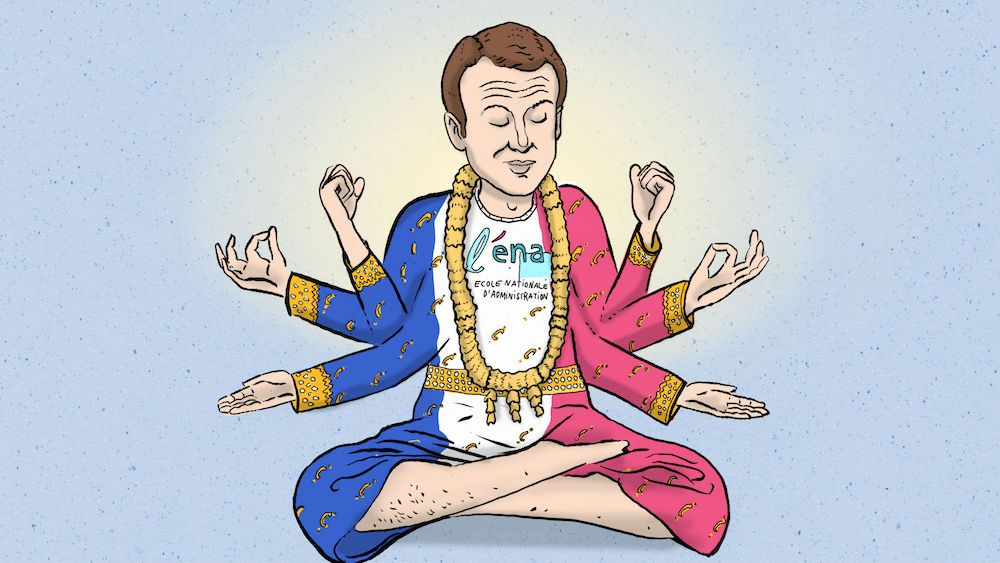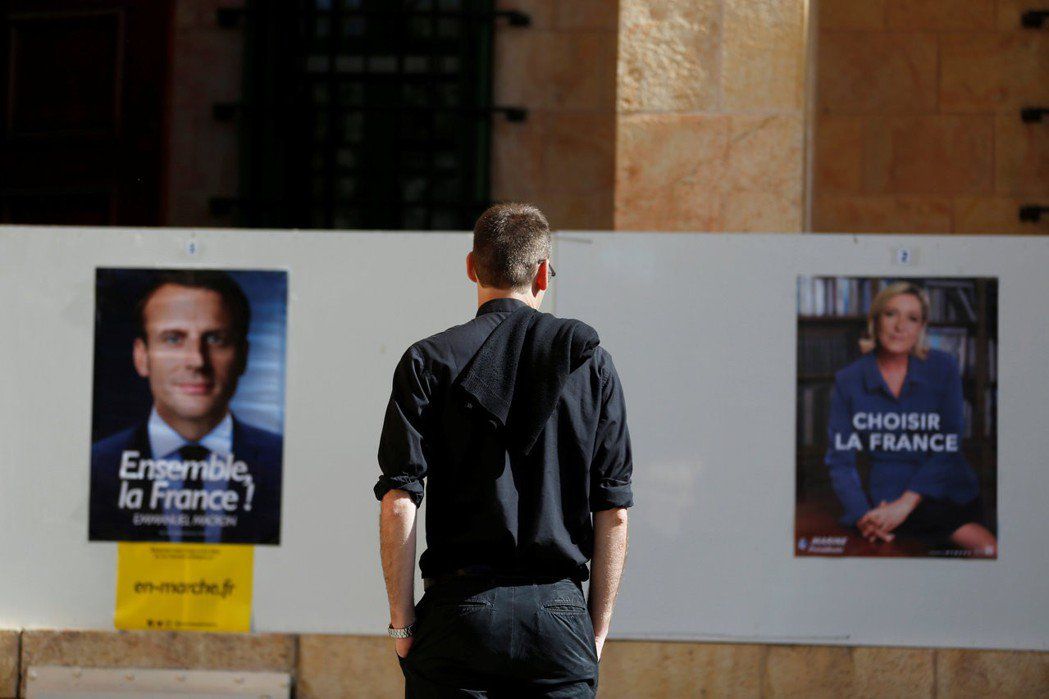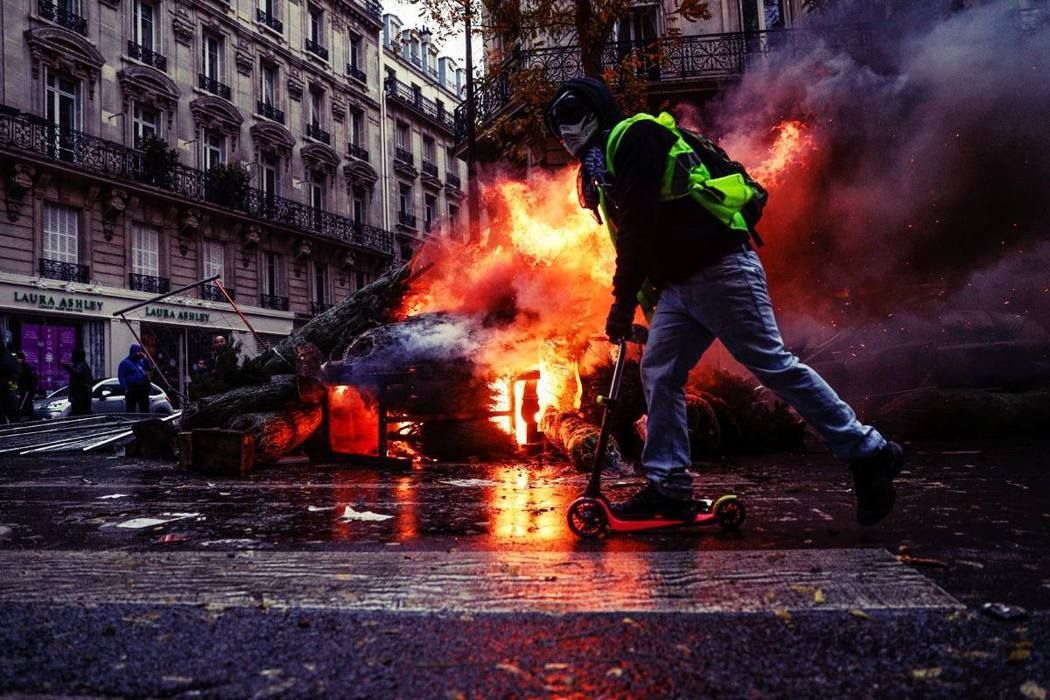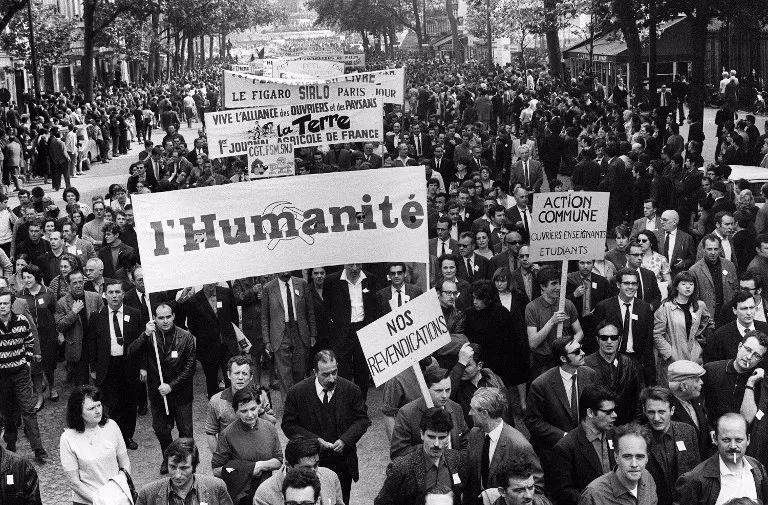Dreaming of De Gaulle's Macron: The "French King" who "wanted and wanted"
Written | New Bremen
On April 20, France will hold the only televised debate of the 2022 presidential election, with incumbent President Emmanuel Jean-Michel Frédéric Macron against Marine Le Pen of the National League. . Compared to five years ago, Le Pen and Macron seem to be the same. Le Pen is still making mistakes, and Macron is still a good teacher. Time seems to go back five years ago.
Six years ago, Macron, who "defeated" from the socialist government, founded his own party, La République En Marche!. Before that, he was a key member of the cabinet of two Socialist Presidents. He won the 2017 presidential election by a wide margin. In the National Assembly elections a month later, the Republic went ahead and won 53% of the seats. At the time, not long after Trump took office, the far right was becoming a global threat, and Macron was seen as a hope for Europe and the world.
Five years passed quickly. Macron wins again. The vote count on the evening of April 24 showed Macron beating Le Pen with 58.8% of the vote. But the gap has narrowed further, with Macron taking 66 percent of the vote five years ago. In his post-election speech, Macron acknowledged that many people voted for him in the second round, entirely to prevent the far right from taking power, and he thanked these voters.
Macron on the left and right
When Macron emerged five years ago, he called himself a leftist. In a book he published in 2016, he declared himself "a leftist who wants to reform the country and believes in freedom. This is my culture, where I come from." Five years later, speaking of Macron to the French would be A left wing, that would probably get a lot of laughter.
Macron has been known to favor both left- and right-wing views in his speeches, then connect them with en meme temps (French for simultaneously). Many observers, and even many of his supporters, point to this habit as evidence of Macron's lack of any fundamental political convictions. Macron remains a mystery even today, as The Economist describes it: a leader who came out of nowhere, did not belong to any party system, defied ideological labels and was oddly rootless .

Macron does appear to be a leftist at times. He was also seen as an environmental president when he first took the presidency five years ago. This seems even more so during the pandemic. Under Macron, the French government has invested 200 billion euros in support of French companies that have been hit hard by the epidemic; at the same time, it has provided employees who have been forced to leave work more generously than anywhere else. Partial unemployment benefits.
Still, as a label Macron avoided, he remains a "president of the rich". Counting the many policies since Macron came to power in 2017, this label does not seem to be a slander. Macron abolished the wealthy inheritance tax as soon as he took office, and the treasury lost at least 300 million euros. In addition, he revised the labor law to give employers the power to dismiss at will, cancel the establishment of occupational safety and health committees in enterprises, and limit the power of trade unions; he also accelerated the privatization of state-owned enterprises since the spring of 2018, opened up foreign capital to enter the French railway market to compete, and reduced the Welfare and labor security for railway workers.
More strikingly, Macron's cabinet is filled with ex-members of the center-right party Les Républicains. Its former prime minister, current interior minister and finance minister are all former Republican figures. In the final weeks of this year's presidential election, the right even accused Macron of copying his political views. Luc Rouban, a researcher at the Le Centre de recherches politiques at the Institut d'Études Politiques, put it bluntly: "In economics, Macron is centre-right, that's clear. This policy has made the left-wing supporters of Jean-Luc Mélenchon reluctant kingmakers, and it has led to Le Pen's comeback as a "people's livelihood president", almost paradoxically practiced five years ago. "Macron today, Le Pen tomorrow".

Perhaps, we misread Macron in the first place. What he calls himself the left is actually the "Third Way" that has been embraced since the 1990s when the French Socialist Party or the British Labour Party were in power. This centrist line, which has been practiced in other countries for many years, does better explain Macron's political practice. But behind this, there is something deeper that Macron represents.
Sovereignty, Authoritarian, Secularism
Charles de Gaulle is definitely an inescapable name in the modern political history of France. Throughout his life, he was a hero of French salvation, the founder of the French Fifth Republic (Cinquième République), and a criticized French president, who finally resigned after the defeat of the referendum in 1969.
Half a century later, however, every politician from left to right declared himself a Gaullisme. He represents the greatness of France, resistance to foreign aggression, listening to the voice of the people, a strong central government, and clear, conservative values. According to the Green Party presidential candidate, de Gaulle also represented resistance to climate change. Five months ago, all the presidential candidates, except Macron and Marine Le Pen, made a pilgrimage to Charles de Gaulle's grave.
But put all that claim aside. No one is more of a true "Gaullist" than Macron. Some observers have summarized de Gaulleism into three words, sovereignty, authoritarianism, and secularism. These three words can also sum up Macron's past five years in power.
In 2017, Macron mediated in the Middle East to free Lebanese Prime Minister Saad Hariri (سعد الدين رفيق الحريري), who was detained by Saudi Arabia at the time, and organized several conferences on the Libyan civil war; the 2019 UN General Assembly During that time, he conducted shuttle diplomacy between Iran and the United States in a New York hotel corridor, and in 2020 he tried to break the political deadlock in Lebanon. Then, as we all know, he tried to negotiate the impasse before the Ukrainian war broke out.
In an interview with Politico in 2019, his close adviser said that Macron, like de Gaulle, believed that "France shines in the world" and that France will be a "ubiquitous mediator". Meanwhile, Macron has become known as the leader of the EU after Merkel left office, or, at least, as he calls himself. He has been steadfast in Brexit negotiations with the UK, he has worked to strengthen Europe's autonomous defence forces and he has also funded the summer 2020 post-pandemic recovery fund in the EU's first collective debt facility. In 2019, in a speech to the French diplomatic corps, he said, "We must rebuild a collective narrative and a dream. This is why I firmly believe that our efforts should be seen as the efforts of European civilization".
This is no different from de Gaulle. De Gaulleism first means "strategic autonomy" and "pan-European ideals", two words that have been inseparable in diplomacy during Macron's five years in power. But Macron has a more de Gaulle side.
Gérard Araud, the former French ambassador to the United States, said that "Macron is alone, he decides everything by himself". If there was one word to sum up Macron's governing style, it would be control. Such an executive machine can be effective, especially when it comes to enforcing manifesto promises that other presidents have struggled to implement. During the pandemic, many important decisions were made by Macron with the strong opposition of his cabinet and staff.
It's hard not to be reminiscent of De Gaulle. After all, the most important action of de Gaulle in his later years, and the main source of his controversy, was the establishment of the French Fifth Republic. In 1958, the post-war French Fourth Republic (Quatrième république) was plunged into political turmoil by Algeria's war of independence. De Gaulle was appointed prime minister under pressure from a military coup after stepping down in a political battle with the left. Taking advantage of this opportunity, de Gaulle pushed for constitutional amendments to increase the powers of the president, and in subsequent elections he became the first president of the Fifth Republic.
The political structure of the Fifth Republic fully reflects de Gaulle's political philosophy. He believes that France will decline because of the eternal quarrel between politics, society and intellectuals, so France should be permanently united by a leader, a country or a project, and through an effective balance of power, economic planning and social participation. Avoid internal struggles.
In his 2015 book La force de gouverner, Ninicolas Roussellier, a researcher at the Centre for the Study of History at Sciences Po, analyzed the referendum-style elections created by the constitutional revisions led by de Gaulle. Endowed the President with unparalleled "hyper-legitimacy". Since then, the executive branch led by the French President has broken away from the tradition of the legislative power restricting the executive power brought by the background of the French revolution, and has shown the characteristics of the dominant power of the mobile power.
This feature has even continued to the political party founded by Macron himself. The Republic Forward is almost his own party. The party implements Macron's single concept, and most of its members are well-educated elites and cadres. High homogeneity. The party's majority parliament is also the most elite of the French Fifth Republic: 8.5% from the popular class, 23% from the middle class and 68.6% from the upper class.
Macron is also strikingly similar to de Gaulle in his attitude towards mass demonstrations.

The biggest challenge Macron has faced during his career has been the Mouvement des gilets jaunes (yellow vest). Among them, the most controversial is the huge force he used to deal with the yellow vest movement. Slightly conservative data from mainstream French media shows that from the first operation on November 17, 2018 to March 2019, 11 people were killed, 3,800 injured, 8,400 arrested, 900 of whom were killed by the yellow vest movement in France. 7,500 people have been released, 7,500 people have been detained, and 1,796 people have been convicted. During the operation on December 1, 2018 alone, in the face of 5,500 demonstrators, the police fired 7,940 regular tear gas, 800 breakout, 339 explosive tear gas, and 776 boxes of rubber bullets; water cannons used 140,000 liters of water. .
A study by the sociologist Cédric Moreau of the French National Police Inspection générale de la Police nationale found that one-third of the complaints it received were for unlawful police violence. Only 16% of cases that entered the investigation stage were related to this; about 90% of complaints of police violence were for police actions during on-duty hours, but 75% of cases were off-duty complaints, most of which were police off-duty time domestic violence cases.
In the face of torn French society and severe violence, Macron has only offered stricter laws. In April 2019, the French government enacted the "Law to Strengthen and Guarantee the Maintenance of Public Order During Demonstrations" (Loi visant à renforcer et garantir le maintien de l'ordre public lors des manifestations), tightening the approval for demonstrations, and at the same time it will be used during demonstrations. During the period, "the act of covering their face freely without justifiable reason" was classified as a crime. The bill has been criticized since it was submitted to parliament, and France's Conseil constitutionnel later ruled that its provisions prohibiting certain individuals from participating in demonstrations were invalid as unconstitutional.
It's very much like de Gaulle's handling of the May 1968 storm (Mai 68). In 1968, students occupied the school and there was a nationwide strike in France, with demonstrators chanting "Ten years is too long" and "De Gaulle step down". De Gaulle rejected all suggestions for compromise, accusing all actions of a conspiracy of the French Communist Party to seize power, condoning the police's violent law enforcement, and four people were killed in June 1968 alone.

In addition, Macron even shared with de Gaulle his belief in Christian civilization and his insistence on secularism. Due to the subtle influence of his father, de Gaulle was deeply influenced by Catholic teachings, and his political philosophy was closely related to the humanism and social vision inherited from Christian culture. The same goes for Macron, who said in an exclusive interview with French newspaper L'Express in 2020 that "one can live on republican principles in Christian culture and civilization". And when he declared to the French diplomatic corps in his first speech as president that "France's security is the raison d'être of our diplomatic existence, and the fight against Islamic terrorism is the primary objective of our foreign policy", when Macron was in terror It is not difficult to hear echoes of Gaullism in our ears when condemning "Islamic separatism" after the attack, proposing restrictions on foreign imams and "homeschooling" popular among Muslims.
However, this election set a new record of abstentions in the history of the Fifth Republic election, which may reflect the unprecedented level of social rupture in France. Mainstream political parties are falling apart, with the right wing refusing to cooperate with far-right parties while appropriating far-right discourse and political views. The far right is pressing hard, and they have already entered the mainstream after more extreme political forces have already made their appearance in French politics. Today, de Gaulle is known as one of the greatest figures in French history. Can Macron, who has inherited the mantle of Charles de Gaulle, solve the problems he is facing? Or will he be like his idol, who, despite winning nearly 60% of the vote in the 1968 parliamentary elections, will be ousted in the ensuing referendum? Five years from now, will the prophecy of "Macron today, Le Pen tomorrow" really come true?
Everything is unknown. The arduous journey that belongs to France and Macron officially started after Macron's difficult election campaign, and there is no answer in the thick fog ahead. I can't help but recall that during the presidential debate five years ago, Le Pen described Macron as a treacherous banker and a representative of vested interests, while Macron retorted that Le Pen was selling drugs in the arena, and his political ideas were pure bragging.
Maybe they are both right.
(Editor in charge: New Bremen)
Like my work? Don't forget to support and clap, let me know that you are with me on the road of creation. Keep this enthusiasm together!
